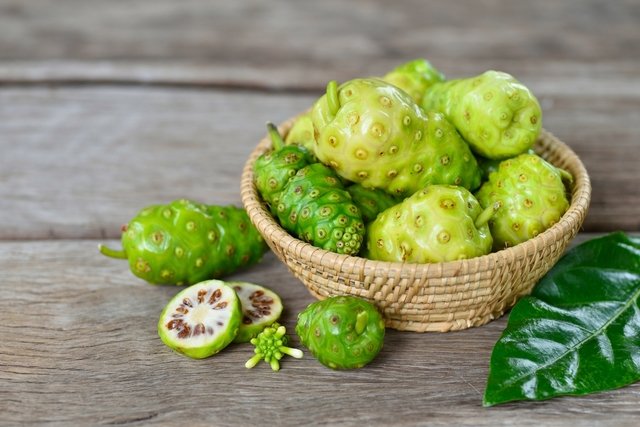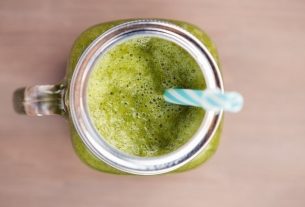Noni, whose scientific name is Morinda citrifoliais a fruit originating from Southeast Asia, Indonesia and Polynesia, and is widely used in these countries due to its supposed medicinal and therapeutic properties.
Noni fruit has anti-inflammatory, antioxidant, antimicrobial and hypoglycemic properties, and therefore could help prevent chronic diseases, combat premature aging and increase immunity.
Noni can be found both in natural form and in juice form. However, industrialized versions of this fruit are not approved by ANVISA in Brazil. This happens because more scientific studies on humans still need to be carried out to prove the benefits, recommended dosage and safety of noni.

What is it for
The possible benefits of noni fruit are:
- It would help prevent aging and the onset of chronic diseases, as it contains vitamin C and other natural antioxidants;
- It can combat microorganisms and inflammation in the body, as it has polyphenols that give it antibiotic and anti-inflammatory potential;
- Power supply, as it provides carbohydrates and proteins for the body;
- It can promote maintaining the health of skin, hair and nails, strengthen the immune system and protect vision, as it is rich in beta-carotene, vitamin A and vitamin C;
- It would help decrease oxidative stress and free radical damage to cells, as it is rich in vitamins B1, B2, B3, B5, B6, B12, C, E and folic acid.
It is important to remember that these benefits have not yet been proven in humans, as there are not enough studies to prove its action, the recommended dose, contraindications and safety. For this reason, consumption of the fruit should be avoided.
The noni fruit has similar physical characteristics to soursop and soursop fruit, however, these fruits should not be confused, as they have very different properties.
Possible risks of noni fruit
The noni fruit is not approved in Brazil by Anvisa for the production and sale of industrialized products. This is because there are still no studies carried out on humans that prove the safety of this fruit, in addition to the fact that some cases were reported in 2005 and 2007 of serious liver damage after ingesting noni juice. This side effect was most observed in people who consumed 1 to 2 liters of noni juice over a period of approximately 4 weeks.
Furthermore, it was found that noni concentrations above 1000 mg/kg can have a toxic effect on the body, in addition to causing gastrointestinal irritation, a feeling of discomfort and damage to the kidneys and liver.
Therefore, for safety reasons, it is not recommended to consume noni in any quantity, as more scientific studies on humans still need to be carried out to prove the benefits, recommended dosage and safety of consuming noni.
Does noni fruit fight cancer?
Popularly, noni fruit is known to help fight cancer. This possible benefit is associated with the presence of damnacanthal, a compound extracted from noni roots with anti-cancer properties and which has been studied in several cancer research studies, but which has not yielded significant results so far.
However, studies on the possible benefits of noni against cancer have only been carried out in cells, in the laboratory, and have yet to be evaluated in humans.
Does noni fruit help you lose weight?
Despite reports that noni fruit helps you lose weight, it is not yet possible to prove this theory, as more scientific studies are needed to prove this possible benefit and effective dosage.
Furthermore, it is normal to lose weight quickly when the body does not function normally, and weight loss caused by consuming noni is more likely to be caused by the emergence of liver disease.
Bibliography
- NATIONAL CENTER FOR COMPLEMENTARY AND INTEGRATIVE HEALTH. Noni. Available at: <https://www.nccih.nih.gov/health/noni>. Accessed on February 9, 2024
- NATIONAL HEALTH SURVEILLANCE AGENCY (ANVISA). Technical Report no. May 25, 2007. 2007. Available at: <https://www.gov.br/agricultura/pt-br/assuntos/inspecao/produtos-vegetal/legislacao-de-produtos-origem-vegetal/biblioteca-de-normas-vinhos-e- beverages/informe-tecnico-no-25-de-may-de-2007_anvisa.pdf>. Accessed on February 9, 2024
- PIMENTEL, Danielly D. et al. Use of Noni by cancer patients. Health and Science Magazine. Vol 5. 1 ed; 37-44, 2016
- BARBOSA, Andreia et al. Morinda citrifolia: facts and risks about using noni. Fitos Magazine. Vol 11. 2 ed; 119-249, 2017
- CENTER FOR TOXICOLOGICAL STUDIES FEDERAL UNIVERSITY OF CEARÁ. Noni Toxicology. Available at: <http://www.cetox.ufc.br/boletins/arquivos%20boletins/Boletim%2002%20Noni.pdf>. Accessed on March 19, 2021
- SHALAN, Nor AAM; MUSTAPHA, Noordin M.; MOHAMEN, Suhaila. Chronic toxicity evaluation of Morinda citrifolia fruit and leaf in mice. Regulatory Toxicology and Pharmacology. Vol 83. 46-53, 2017
- ZHANG, Jian-huan; XIN, Hai-liang; XU, Yue-ming et al. Morinda officinalis How. – A comprehensive review of traditional uses, phytochemistry and pharmacology. Journal of Ethnopharmacology. Vol 213. 230-255, 2018
- SINGH, Bharat; SHARMA, Ram A. Indian Morinda species: A review. Phytotherapy research. Vol 34. 5 ed; 924-1007, 2020

Sign up for our newsletter and stay up to date with exclusive news
that can transform your routine!
Warning: Undefined array key "title" in /home/storelat/public_html/wp-content/plugins/link-whisper-premium/templates/frontend/related-posts.php on line 12
Warning: Undefined array key "title_tag" in /home/storelat/public_html/wp-content/plugins/link-whisper-premium/templates/frontend/related-posts.php on line 13



